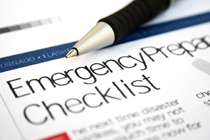Tips for Homeowners and Renters

- Take an inventory of your valuables and belongings. This should include taking photographs or a video of each room. This documentation will provide your insurance company with proof of your belongings and help to process claims more quickly in the event of disaster. Watch also the video for Protect Yourself: Home Inventory.
- To enable filing claims more quickly, keep sales receipts and/or canceled checks. Also note the model and serial numbers of the items in your home inventory.
- As you acquire more valuables — jewelry, family heirlooms, antiques, art —consider purchasing an additional “floater” or “rider” to your policy to cover these special items. These types of items typically are not covered by a basic homeowners or renter’s insurance policy.
- Remember to include in your home inventory those items you rarely use (e.g., holiday decorations, sports equipment, tools, etc.).
- Store copies of all your insurance policies in a safe location away from your home that is easily accessible in case of disaster. You may want to store your policies and inventory in a waterproof, fireproof box or in a safe, remote location such as a bank safe deposit box. Consider leaving a copy of your inventory with relatives, friends or your insurance provider and store digital pictures in your e-mail or on a Web site for easy retrieval.
- Know what is and is not covered by your insurance policy. You might need additional protection depending on where you live. Make sure your policies are up to date. Contact your insurance provider annually to review and update your insurance policy.
- Keep a readily available list of 24-hour contact information for each of your insurance providers.
- Find out if your possessions are insured for the actual cash value or the replacement cost. Actual cash value is the amount it would take to repair or replace damage to your home or possessions after depreciation while replacement cost is the amount it would take to repair or replace your home or possessions without deducting for depreciation. Speak with your insurance provider to determine whether purchasing replacement coverage is worth the cost.
- Speak with your insurance provider to find out if your policy covers additional living expenses for a temporary residence if you are unable to live in your home due to damage from a disaster.
- Appraise your home periodically to make sure your insurance policy reflects home improvements or renovations. Contact your insurance provider to update your policy accordingly.
For more information on who to call or what to do in the event of a disaster, see our Property Damage Concerns page.






